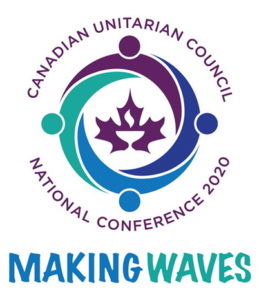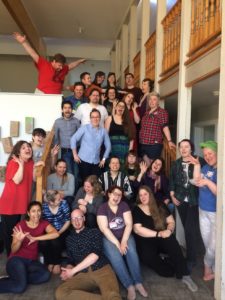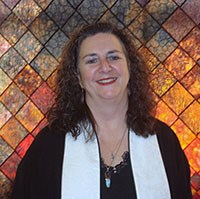CUC eNews: March 10, 2020 – Issue 109
In This Issue:
- Making Waves a One of a Kind Experience
- Young Adult Programming at Making Waves
- Minister Profile: Debra Faulk
- Reconciliation, Consent, and Poverty
- Celebrating International Women’s Day
- Congregational Resources for Handling the COVID-19 Virus
- Improvements to the CUC’s Theological Education Fund
- In Memoriam
- Upcoming Events
Making Waves a One of a Kind Experience

The Making Waves host team is hard at work ensuring this year’s Canadian Unitarian Council’s national conference will be one you’ll eagerly anticipate, enjoy, and remember. The Universalist Unitarian Church of Halifax is looking forward to welcoming each and every attendee to their beautiful city and providing the warmest of Maritime receptions.
This year’s conference has a unique Atlantic flavour, especially when it comes to music. Under Choir Director Vanessa Papillon’s expert guidance, the “open to all” choir promises to be a fun experience for choir members. On Saturday evening, there are fiddlers, other musicians, and a Contra Dance caller lined up for a foot-stomping Maritime kitchen party. The specially-composed theme song for Making Waves is ready to be learned on Friday evening and sung throughout the weekend. And Ukulele enthusiasts will go home with new skills after the UU Ukuleles workshop.
While this year’s conference will be unique and fun in many ways, it will also feature more of the engaging and thought-provoking streams and workshops you’ve come to expect from CUC conferences, all of them tied into this year’s theme (the complete program guide will be available in April). “Can We Talk? A Conversation on Canadian Racism and White Supremacy” will examine anti-racism as a way to ‘make waves’ within UU congregations and our larger Canadian society with a panel presentation followed by an informal discussion with participants.
“What we hope this workshop will do for people who show up is to move them from wherever they are in terms of awareness to a deeper level,” says Dr. Wilburn Hayden, one of the four presenters. “And then the second part is to begin to talk about this, not just one on one but with a group of people, as to how we can move forward as a faith group.”
To add a further incentive to attend Making Waves, this year’s conference is designed to be as financially accessible as possible. The sliding scale option will allow registrants to choose from four price options, and a second “choose your own amount” options allows registrants to pay a smaller (or larger) amount than the sliding scale amounts.
Questions about the conference can be directed to conference@cuc.ca. But should you wonder “is this worth attending?” we think you’ve already got your answer.
NOTE on COVID-19 virus and the conference: at this point, the conference is going ahead. CUC staff will continue to monitor the situation and take the lead from national health experts. If a decision to cancel is necessary, you will be notified. Those who have registered will be contacted about full refunds. Some insurance companies and travel agencies are may not cover flights purchased after the virus was made known. Most credit cards will cover cancellations or changes. Before booking travel, check the terms of your insurance coverage, or purchase tickets that allow changes to your fare.
Young Adult Programming at Making Waves
CALLING ALL UU YOUNG ADULTS (18-35)! This year we will gather in Halifax, Nova Scotia to build an intentional and beloved community, strengthen our cross-country connections, and grow as spiritual beings. There are plentiful ways for young adults to engage in this year’s conference. Join us for a medley of multigen events and workshops, a myriad of young adult worship and social time, and a multitude of time to gather with older youth for bridging activities.
Registration is now open until April 30th. Register on the Adult/Young Adult event page. The registration fee includes all meals and events between Friday and Monday, but does not include accommodations. Travel and registration subsidies are available until March 15 – for more information check out the Dawning Future Youth and Young Adult Subsidy Fund. If you want to travel by train, there is a 10% discount available!
Alongside this year’s conference theme of Making Waves, we will build on the imagery of The Ripple Effect, the CUC’s campaign on water and its related environmental issues. As young adults we will gather to challenge the status quo, practice radical inclusion, and help push our faith to remain relevant into the future. This conference is a wave you won’t want to miss, so jump on that board and let’s ride this wave all the way to Halifax!
RSVP to the Facebook event for updates! You’ll also want to follow @yayasofcanada on Instagram to meet the planning team and more! Contact Carter Mahoney, Chorus Coordinator, at chorus@cuc.ca to get involved or for any questions.
Minister Profile: Debra Faulk
Rev. Debra Faulk has served the Calgary Unitarians since the fall of 2010. A lifelong Unitarian, she first experienced the call to ministry as a member of the Liberal Religious Youth at her congregation in Montreal, while participating in a worship service in her early teens. Prior to becoming a minister, Faulk served in several roles within her congregation in Victoria, including as a youth advisor, Director of Religious Education, and Lay Chaplain.
Relationships are the part of ministry Faulk finds most rewarding, whether with congregants, colleagues, or other organizations. She is particularly interested in interfaith connections and community organizing, which, along with congregational life, have relationships as the foundation.
“The moments when I’m doing a Sunday morning service and I witness the whole room take a sigh or a head nod and know that there’s something that’s been spoken into the space that’s allowing people to feel more connected,” she says are the most satisfying.
Faulk believes Unitarianism’s ability to foster connections is the key to it remaining relevant into the future.
“I do think the biggest thing people are longing for is a sense of belonging in community,” she says, “and if we can provide and offer a safe place where community can be deepened for people we will be ever relevant.”
Reconciliation, Consent, and Poverty

Source: CBC
By Erin Horvath, CUC Social Justice Lead
Like many of you, I have been following the conversation happening nationally and within Unitarian circles about how to respond to the opposition of the Wet’suwet’en Hereditary Chiefs to the pipeline construction, as many colonial elected Chiefs have consented to this project. The very nature of consent implies that it must be uncoerced, of free will, and with an understanding of the consequences.
It has been noted many times in the media, and I have certainly witnessed it continuously in my community development work, that Indigenous communities experience chronic and pervasive poverty that far exceeds the national average and an unacceptable lack of access to clean water. Sixty-one reservations have long-term water advisories in effect, with 4 new advisories added since January 2020.
Many elected Band leaders feel helpless to alleviate this poverty and are looking to economic projects, such as mines, forestry, and pipelines, to create a source of revenue for their communities. An important question to ask is, “If these communities were not trapped by poverty, would they still be motivated to agree to a pipeline (or other natural resource projects) through their territories, given these projects often conflict with their traditional values and cause so much division within their communities?”
I suspect not. Time and time again, these types of “either-or” conversations happen when people feel the only two choices are to live in poverty or move ahead with a project that threatens their land, values, and relationship to it. As long as the Federal government fails to meet their nation-to-nation treaty obligations, poverty will be the norm for Indigenous communities. If poverty motivates people to do something that they may not otherwise feel compelled to do, is it really accurate to say they are truly consenting?
The approach of “divide and conquer” is not a new tactic when it comes to the government’s approach to Indigenous peoples. Putting Indigenous nations in positions where they feel they must sacrifice their worldviews, relationships (in this case, between members supporting hereditary as opposed to elected leadership), values, and collectivity in order to have their basic needs met, IS colonization in action today.
Our government may talk about commitment to reconciliation, but federal action does bear this out in practice – it’s the same old goals and tactics (promote poverty, divide & conquer, take land) wrapped up in shiny new paper. If we really want to achieve conciliation, we need to revisit the foundational agreements impacting Indigenous sovereignty and Title to land. Without this type of deep change, the gesture of reconciliation will remain just that — a gesture.
Read the CUC’s Reaffirmation of Solidarity with the Wet’suwet’en
Celebrating International Women’s Day
By the Canadian UUWomen’s Association
The Canadian Unitarian and/or Universalist Women’s Association (CU*UWA) prepared a service package to celebrate International Women’s Day on March 8, 2020. It is our goal to have IWD services and/or activities in all Canadian congregations every year. Will you help us achieve this goal of promoting awareness of gender equality and women’s issues?
Our 2020 theme is Wisdom. Our package includes options for your chalice lighting, readings, blessing, and closing words, suggestions for sermons and interactive services, reflection questions for individuals or small groups, comments by CU*UWA Council members, original artwork and poetry, and resources for study. If your congregation hasn’t yet held an IWD service, we encourage you to use this resource.
We hope this material inspires you to reflect on your own sources of wisdom, your ways of knowing and experiencing the world, the Divine Feminine and goddesses, prophetic and authentic voices of women and femmes, and your vision of a world informed by women’s wisdom. We encourage you to share your stories on our Facebook page, in your congregations, and in your creative work. We will be sharing prompts related to our package on our Facebook page every day from February 29 to March 8, 2020, and would love to read your responses
Explore the International Women’s Day Package
Congregational Resources for Handling the COVID-19 Virus

Source: CDC
Given the news about the continued spread of the COVID-19 Virus, congregations may be wondering how they can best prepare for it becoming more widespread. The risk in Canada remains low; stay up-to-date with information and resources from Health Canada.
The best way to prevent illness is to avoid being exposed to this virus. However, as a reminder, the US-based Center for Disease Control always recommends everyday preventive actions to help prevent the spread of respiratory diseases, including:
- Wash your hands often with soap and water for at least 20 seconds, especially after going to the bathroom; before eating; and after blowing your nose, coughing, or sneezing. Wash your hands as if you’ve just handled hot peppers and need to remove your contacts!
- If soap and water are not readily available, use an alcohol-based hand sanitizer with at least 60% alcohol. Always wash hands with soap and water if hands are visibly dirty.
- See the CDC’s video on how to wash your hands properly – yes, there are things you didn’t know about hand-washing!
- Refrain from shaking hands, hugging, or touching
- Avoid close contact with people who are sick.
- Avoid touching your eyes, nose, and mouth.
- Stay home when you are sick.
- For those who have to stay home on a Sunday, the First Unitarian Congregation of Toronto is a congregation which livestreams its services
- Cover your cough or sneeze with a tissue, then throw the tissue in the trash.
- Clean and disinfect frequently touched objects and surfaces using a regular household cleaning spray or wipe.
- Follow CDC’s recommendations for using a facemask.
-
- CDC does not recommend that people who are well wear a facemask to protect themselves from respiratory diseases, including COVID-19.
- Facemasks should be used by people who show symptoms of COVID-19 to help prevent the spread of the disease to others. The use of facemasks is also crucial for health workers and people who are taking care of someone in close settings (at home or in a health care facility).
-
CDC does have specific guidance for travelers.
The World Health Organization provides rolling updates on the Covid-19 situation – check their website for current details, including travel advice.
Improvements to the CUC’s Theological Education Fund
From the Theological Education Funds Committee
Percy Simpson Bailey believed that Unitarianism had a good deal to offer to the world; therefore, it should have well-trained professionals in positions of leadership. That only happens if people can afford to get the training.
Formal training for the Unitarian Universalist ministry involves at least enough time at a university or theological college to attain a Masters of Divinity degree, or equivalent, as well as practical experience: field placements, an internship, and a term of hospital or institutional chaplaincy training. If a person studies full-time, this process takes at least 3½ years beyond undergraduate school. That means living with a reduced income while still having all the normal living expenses, plus possibly travel expenses to work or live in a different location, and tuition fees of many thousands of dollars.
There is some financial support available through the CUC’s Theological Education Fund (TEF). The TEF consists of the Percy Simpson Bailey fund and the Rouff/Mackie – Jenkins fund. Congregations and individuals can – and do – contribute to the TEF through offerings taken at special events, such as installations or ordinations. In addition, some congregations make an annual regular offering, and all are encouraged to do so.
Canadians studying for the UU ministry may apply for a bursary through the Theological Education Fund, and this year there are NEW opportunities to support UU ministers in Canada with continuing education expenses. Coming next year, there will also be bursaries available for Canadian UU congregations who wish to support an intern minister. These changes have been made because ministers in small or part-time settlements or community ministries may not have the professional expense budgets necessary to further their continuing education and faith formation. Meanwhile, many congregations that might be effective teaching congregations are limited in their ability to offer internships because of the associated costs.
The deadline for applying for a bursary from the fund is March 31, 2020.
New members needed: The TEF selection committee is looking for new members. Maybe you were once the beneficiary of a scholarship, bursary or grant for a project or course of study. Would you consider giving back by serving on the committee? Maybe you have other reasons for serving our movement in such a useful way. Whatever your motivation, please consider this as a way to support the future of UU ministry in Canada. The committee is now receiving expressions of interest in joining it. It meets irregularly and infrequently, but more often between January and April of each year. If you wish to apply to join this committee, please contact the committee, tef@cuc.ca
Learn More About the Theological Education Fund
In Memoriam
Christopher Fulton, son of former Canadian Unitarian Council parliamentarian Bill Fulton, passed away on February 18, 2020, in Hamilton, Ontario. We send our condolences and thoughts to his family.
Visit & Like the Canadian Unitarian Council on Facebook!
Upcoming Events
Share what’s going on in your congregation. Contact communications@cuc.ca
Youth and Young Adults
Online – Gathered Here: Young Adult Check-In, April 13, June 8, July 13, August 10 – 8 p.m. ET
Gathered Here is a monthly online check-in and gathering for Canadian Unitarian Universalist young adults. Zoom (https://zoom.us/j/6792849010)
Connect and Deepen – Virtual Gathering, Monthly – April 12, May 10, June 14, August 9, Sept. 13, Oct. 11, Nov 8 – (2nd Sunday of the month), 4:00 – 5:30 p.m. ET Join us for the opportunity to discuss matters of spiritual and theological significance in small groups and connect with people across the country.
Regional and Online Events
Online: Mission Statement: Who Are We? What Do We Do?, March 21, 1:00 – 3:00 p.m. ET
This webinar will provide some background on mission statements and will also give us an opportunity to practice using one as a decision-making tool. Registration deadline: March 12
Designing and Leading Rites of Passage, April 3 – April 5, Westwood Unitarian Congregation, Edmonton, AB
This workshop is for those considering Lay Chaplaincy, recently appointed Lay Chaplains and members of a congregation’s Lay Chaplaincy committee. It provides basic guidelines on the management of a congregation’s Lay Chaplaincy program and the training new Lay Chaplains need to begin their work. Registration deadline: March 7
Conflict and Congregational Vitality, July 18, 9:30 a.m. – 3:30 p,m. ET, First Unitarian Church of Hamilton, Hamilton, ON Congregations, in an attempt to foster unity and shared identity, sometimes foster a culture of conflict avoidance. Yet, without conflict we get stuck doing things ‘the way we always have’ and resist change and possibilities. In this workshop leaders and emerging leaders will learn how to manage themselves when conflict arises and will also learn how to ensure congregational priorities take precedence over personal preferences. Registration deadline: July 8
Serving with Spirit: Nurturing UU Leaders, August 21 – August 23, Queen’s Hour of Retreats, Saskatoon, SK
Explore where you find the “springs” which fill your life’s well of energy, and how you can live out of that rich resource. There will be opportunities to connect with and be informed by other UUs, times to engage with others as we learn new and hone familiar strategies, and space to do deep reflection, identifying and strengthening the rich practice potential in your own life. Registration deadline: July 30
National
AGM Online Voting Orientation, April 7, April 8, April 16 or April 27 at various times
The 2020 AGM will include on-line participation and voting, with the same system that was used in 2019. We strongly recommend attending an online voting orientation session in April if you are a new delegate and for the online voting managers. Please sign up here.
2020 CUC National Annual General Meeting and Conference, May 15 – 17, 2020, Halifax, Nova Scotia Hosted by the Universalist Unitarian Church of Halifax
The theme for Conference 2020 is Making Waves! Register now, deadline April 30!
CanUUdle XX: Celebrate 20 years of CanUUdle!, May 15 – 18, 2020, Halifax, Nova Scotia
Hosted by the Universalist Unitarian Church of Halifax
CanUUdle is the beloved annual youth conference where youth and adult allies from across Canada (and sometimes from the States!) gather to worship, build community, and grow in their Unitarian Universalist identities alongside the multigenerational National Conference. In 2020 CanUUdle will be celebrating its 20th anniversary.
Note: Registration limits for CanUUdle were reached very quickly. Registration is temporarily closed while staff explores options for increasing capacity. Please email canuudle@cuc.ca to be placed on a waiting list, or if you have questions.
Chorus 2020: National Young Adult Conference, May 15 – 17, 2020, Halifax, NS
Join UUs from across Canada at the National Conference, where the theme for 2020 is Making Waves. There will be specific programming, worship, and socializing opportunities just for young adults within the multigenerational Conference, as well as the beloved Bridging Ceremony and dinner with the youth of CanUUdle. Registration will open in winter 2020. Register now, deadline April 30!
International
UU-UNO Intergenerational Spring Seminar On Climate Justice, April 15 – 18, 2020, New York, NY
Unitarian Universalist Association General Assembly, June 24 – 28, 2020, Providence, RI
Early registration available through March 15.
International Council of Unitarians and Universalists (ICUU) Meeting & Conference, October 26 – November 1, 2020, Montreal, Canada
Supported by the CUC, this ICUU Conference is an excellent opportunity to meet and get to know UUs from all over the world. Donations from Canadians go to support leadership development for participants from emerging members groups. More information coming soon.

